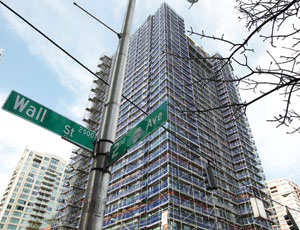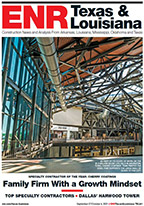The contractor for an occupied, 26-story apartment building in Seattle that has corroding post-tensioning cables disagrees with the owner’s assertion that the nine-year-old high-rise will become unsafe. McCarthy Building Cos. also disputes the cause and scope of the damage to McGuire Apartments, built for $33 million, stated by the local owner, Carpenter’s Tower LLC.

On April 10, the owner announced plans to vacate the building over several months “due to extensive construction defects, which are financially impractical” to repair. A statement by Brian Urback, with the local Kennedy Associates, the owner’s advisor, says, “While there are no imminent tenant safety issues, experts involved in investigation and repair of the building have indicated there eventually will be structural issues that could present safety issues by 2011 and beyond.”
The building, approximately a 90 ft square in plan, has an exterior concrete moment frame for seismic resistance with upturned beams. The floors are made of two-way unbonded post-tensioned slabs.
Alleged construction defects principally involve corrosion of the post-tensioned cables, plus deficiencies in concrete material and reinforcing-steel placement, says the owner. Cable ends are corroding because they were not properly protected with corrosion-resistant paint, the owner alleges. Further, grout used to seal cable ends and anchors was not the non-shrink grout specified and was installed incorrectly, charges the owner, which filed suit against St. Louis-based McCarthy and the local architect, Hewitt, in 2007.
Citing ongoing litigation, Hewitt declines to comment. The local structural engineer, ABKG—not named in the suit—similarly declines to comment.
But McCarthy says that “independent, highly qualified” structural engineers determined the building is “entirely safe, and that with reasonable remediation, maintenance and monitoring, long-term ongoing operations could continue.”
The two sides are meeting on April 15 to present their experts’ material. Mediation is set for summer, a trial for fall.




Post a comment to this article
Report Abusive Comment